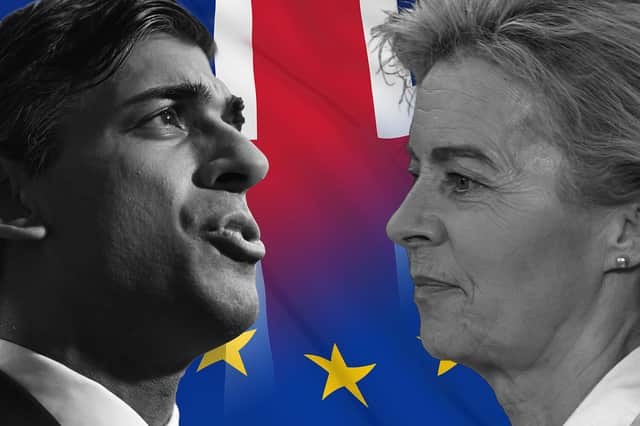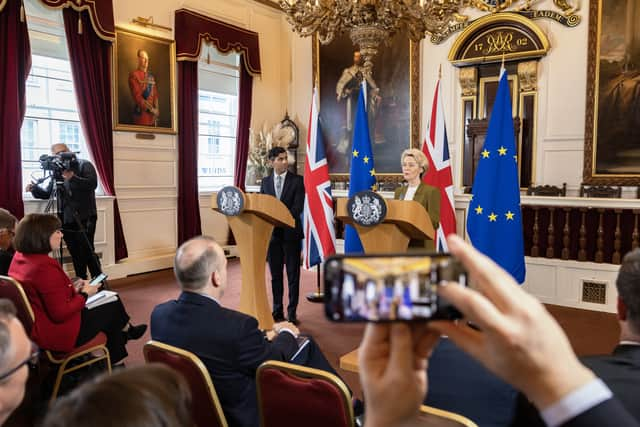Northern Ireland: what is in the Windsor Framework? Taxes and ‘Stormont brake’ explained as Sunak signs deal


The UK and EU will sign off on Rishi Sunak’s Northern Ireland Windsor Framework deal later today (24 March), after MPs voted in favour of a key component of the agreement just a few days ago.
Sunak and European Commission President Ursula von der Leyen struck the deal in February after years of concern over Northern Ireland’s place within the UK post-Brexit.
Advertisement
Hide AdAdvertisement
Hide AdAfter the UK left the EU in 2019, the Northern Ireland Protocol was introduced to avoid a hard border with their Irish neighbours to the south. But the initial protocol received criticism from some unionist parties, who said the agreement had effectively kept Northern Ireland within the EU.
The new Windsor Framework was therefore introduced to help alleviate some of those concerns - and now, MPs have voted in favour of the new ‘Stormont brake’ component, despite a minority opposition from the Democratic Unionist Party and prominent Tories such as Boris Johnson.
Upon the announcement, Sunak said: “I’m pleased to report that we have now made a decisive breakthrough. Together we have changed the original protocol and are today announcing the new Windsor Framework.
“Today’s agreement delivers smooth-flowing trade within the whole United Kingdom, protects Northern Ireland’s place in our union and safeguards sovereignty for the people of Northern Ireland.”
Advertisement
Hide AdAdvertisement
Hide AdHere’s everything you need to know about the new changes to the protocol.
What is in the ‘Windsor Framework’?
The ‘Windsor Framework’ is the name which has been given to the new post-Brexit deal for Northern Ireland. Major topics included in the agreement include trade, taxes and the role of Stormont.
Trade
One of the main points of the Windsor Framework was to facilitate the flow of goods, both from the EU and the UK, through Northern Ireland. The new agreement will resolve this issue which has been highly contentious since the UK left the EU in 2019.
The Windsor Framework will see the introduction of two new trade routes in Northern Ireland to simplify the process. Products which will travel through Northern Ireland to its EU neighbour Ireland will go through a ‘red lane’ - this means that the products being transported will need to pass all custom checks before they cross the Irish Sea.
Advertisement
Hide AdAdvertisement
Hide AdA ‘green lane’ will also be created. This lane will allow products of UK origin destined for Northern Ireland to pass through with customs scrapped. Since Britain left the EU in 2019, the customs process in Northern Ireland has been heavily criticised, with businesses and members of the public burdened with pages of paperwork to send parcels across the Irish Sea.


As a result, Sunak said that more products seen in English, Scottish and Welsh supermarkets will begin appearing in Northern Irish stores. British gardening products will also return to the country.
Taxes
The Windsor Framework will also amend tax policy for Northern Ireland. Previously, the country was excluded from UK tax decisions due to wording in the previous Northern Ireland protocol.
Sharing a land border with Ireland, Northern Ireland was previously tied to tax policy created by Brussels, due to the requirement of it remaining in the single market. However, this has now been amended, which means that the UK’s decision on VAT and excise will also take effect in Northern Ireland.
Medicines
Advertisement
Hide AdAdvertisement
Hide AdThe agreement will also allow for UK-regulated medicines to now be sold and prescribed in Northern Irish pharmacies and health care facilities. The decision will allow these medicines to be used as soon as they are approved at a UK level.
Stormont
Stormont, the devolved assembly of Northern Ireland, has remained in a bitter stalemate over the issue of Brexit. The country has not had a sitting devolved parliament since February 2022, when the Democratic Unionist Party (DUP) removed itself from the power-sharing agreement between unionist and nationalist parties over its opposition to the former Northern Ireland Protocol.
Sinn Fein, the most prominent nationalist party in Northern Ireland, won the most seats for the first time in the party’s history during the election in May 2022. However, with the power-sharing agreement in place, the DUP refused to offer a candidate for deputy first minister, leaving the assembly unable to sit for the past year.
The DUP has remained opposed to any EU laws being implemented in Northern Ireland, as a result of the prior protocol. However, the Windsor Framework will introduce a new process in which Stormont will be able to have a say on any changes to EU law which would impact Northern Ireland.
Advertisement
Hide AdAdvertisement
Hide AdThis will be known as the ‘Stormont brake’. If the ‘brake’ is ‘pulled’ by members of the assembly, the UK government will be able to veto the law.
Sunak told reporters that while most EU laws will not apply to Northern Ireland, there is a requirement for some to be implemented in order to avoid creating a hard border. He said:"The only EU law that applies in Northern Ireland under the framework is the minimum necessary to avoid a hard border with Ireland and allow Northern Irish businesses to continue accessing the EU market".
Comment Guidelines
National World encourages reader discussion on our stories. User feedback, insights and back-and-forth exchanges add a rich layer of context to reporting. Please review our Community Guidelines before commenting.
